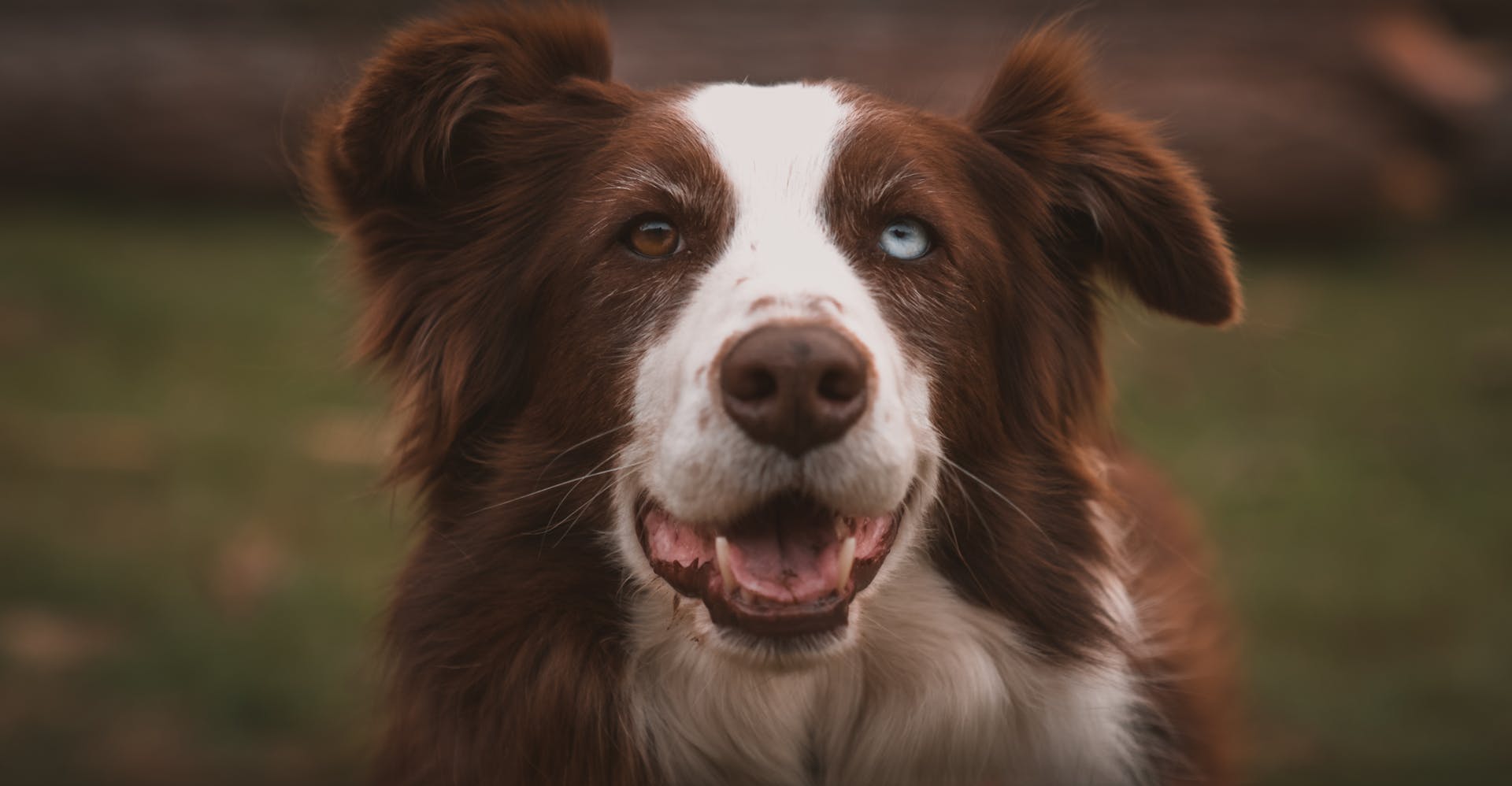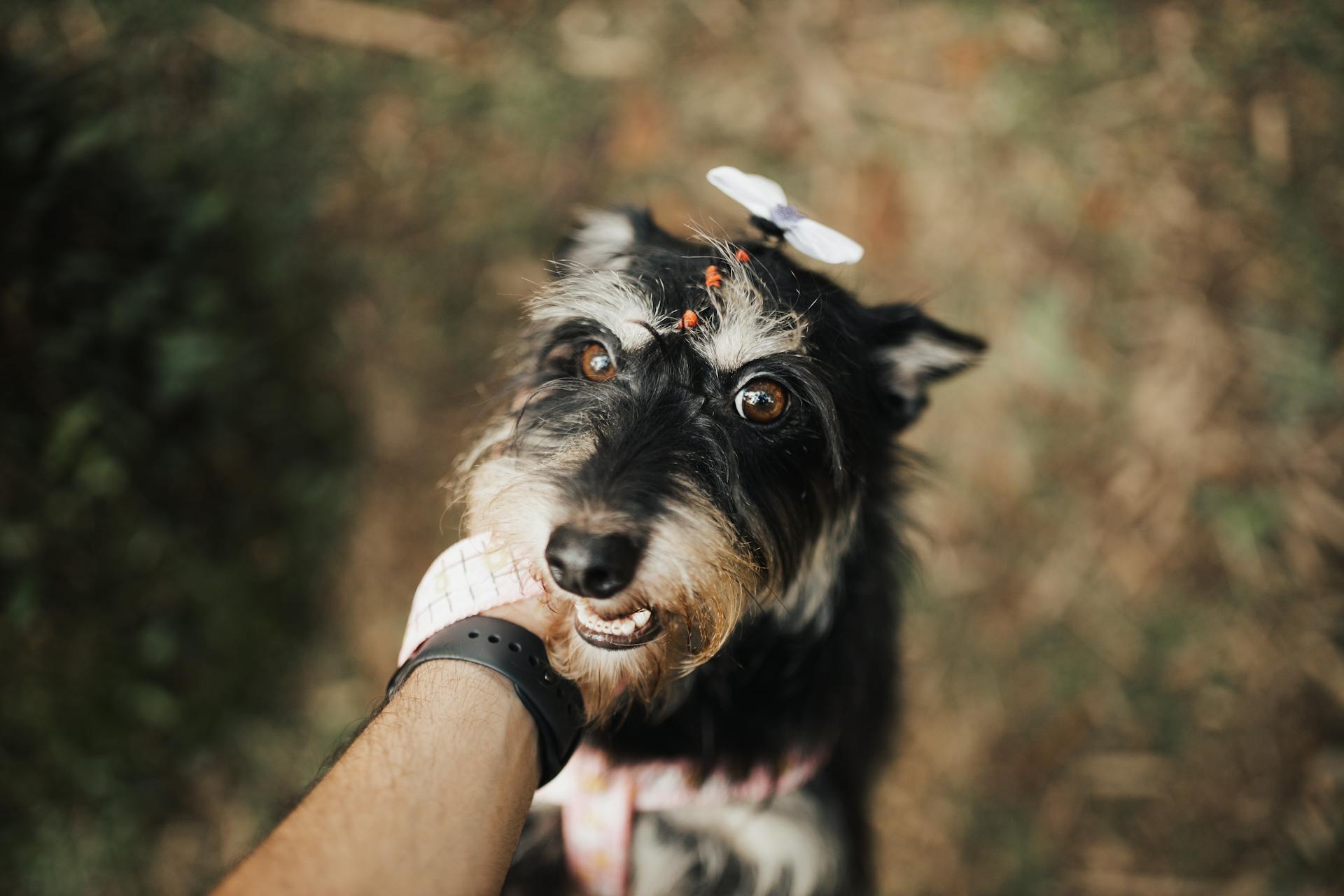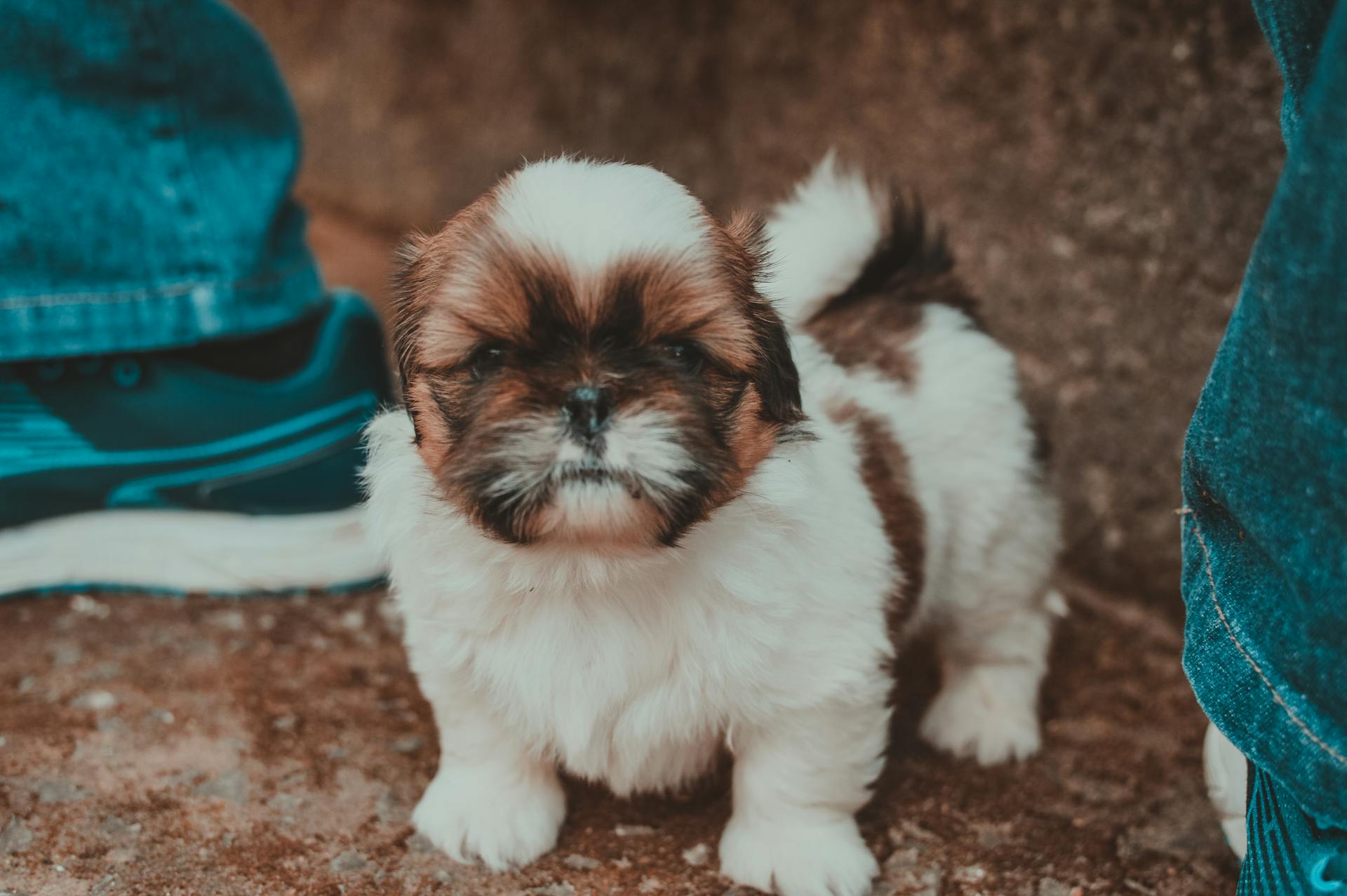
Cloudy eyes in Shih Tzus can be a concerning issue for owners, but understanding the underlying health problems can help you take the right steps to address it.
Cloudy eyes in Shih Tzus are often caused by a condition called cataracts, which is a clouding of the lens in the eye.
This can lead to vision loss and blindness if left untreated.
Cataracts are more common in older Shih Tzus, but they can also occur in younger dogs due to genetics or injury.
Shih Tzus are also prone to a condition called progressive retinal atrophy, which causes the retina to deteriorate over time.
This can lead to blindness in both eyes, often in a short period of time.
Regular eye exams can help detect these conditions early on, allowing for prompt treatment and potentially preserving your Shih Tzu's vision.
You might like: Shih Tzu Eyes Pop Out
Causes of Cloudy Eyes
Cloudy eyes in Shih Tzus can be caused by a variety of factors. Some common causes include injury or the presence of a foreign body, which can lead to corneal edema.
Infectious diseases such as fungal infections and canine infectious hepatitis can also cause cloudy eyes. Eye infections, allergies, and corneal ulcers or other corneal injuries are also common causes of eye discharge and cloudiness.
Some breeds of dogs, including Shih Tzus, are more susceptible to hereditary cataracts, which can occur when the dogs are puppies or as they age. These cataracts can obscure your dog's vision and sometimes lead to an even more serious issue: glaucoma.
Here are some common causes of cloudy eyes in dogs:
- Conjunctivitis (pink eye)
- Eye infections
- Allergies
- Corneal ulcers or other corneal injuries
- Dry eye (KCS)
- Glaucoma
- Entropion
- Ectropion
- Distichia
- Cherry eye
- Foreign object in the eye
- Growth on the eyelid or in the eye, such as a cyst or tumor
It's essential to have your veterinarian take a look at your Shih Tzu's cloudy eyes to diagnose the underlying cause and treat it appropriately.
Nuclear Sclerosis
Nuclear sclerosis is a common age-related condition in dogs that affects the lens of the eye.
As dogs age, most develop a haze within the lens called nuclear sclerosis, which is similar to cataracts but rarely causes vision impairment.
Unlike cataracts, nuclear sclerosis gives your dog's eyes a cloudy, bluish discoloration.
Check this out: Shih Tzu Age
This condition tends to affect both eyes at the same time and doesn't significantly diminish your dog's vision.
Nuclear sclerosis is a change in the lens of the eye that normally occurs with aging, and there is no treatment needed because the condition does not cause serious problems.
It's essential to discuss your dog's aging eyes with your veterinarian so that you know what to expect as your dog grows older.
Regular check-ups with your vet are a good idea, especially if your dog develops nuclear sclerosis, as they will want to look for cataracts, which often develop alongside nuclear sclerosis.
Check this out: Shih Tzu Bloodshot Eyes
Cataracts
Cataracts can occur in dogs due to abnormal lens metabolism, causing white, milky changes to the lens.
The lens in a dog's eye acts like a camera lens, focusing light on the retina where the brain processes the information.
Cataracts are made up of clumped proteins that obscure the lens, making it harder for your dog to see, and in some cases, causing total blindness.
Curious to learn more? Check out: Shih Tzu Small Dogs
Age, trauma, metabolic diseases like diabetes, and genetics are some of the causes of cataracts in dogs.
Some breeds, such as the Australian Shepherd and Labrador Retriever, are more susceptible to hereditary cataracts.
Cataracts can lead to glaucoma, a more serious issue, which is why prompt diagnosis is crucial.
Surgical solutions are available for cataracts, but they are best done early in their formation.
Corneal Dystrophy
Corneal dystrophy is a common condition that affects some dogs, giving their cornea an opaque, cloudy appearance. It's inherited and can be uncomfortable for the dog.
Shetland Sheepdogs are particularly susceptible to epithelial corneal dystrophy, which affects the superficial layers of the cornea. This condition can be uncomfortable for the dog.
Dogs with stromal corneal dystrophy, which affects the middle layer of the cornea, are predisposed to breeds like Airedale Terriers, Cocker Spaniels, and Cavalier King Charles Spaniels. These breeds are more likely to develop this condition.
Endothelial corneal dystrophy affects the deepest corneal layer and can lead to corneal ulcers. Boston Terriers, Chihuahuas, and Dachshunds are genetically predisposed to this condition.
A veterinarian will typically use a microscope with a bright light to identify the type of corneal dystrophy, as well as a fluorescein stain to examine the details of the eye. They may also prescribe antibiotic eye medications to treat any ulcers.
Symptoms and Diagnosis
Symptoms of cloudy eyes in Shih Tzus can be subtle, but they're often noticeable to pet owners. A cloudy eye can appear as a black spot, brown pigment, or a black film on the cornea.
Other symptoms may include redness, increased thick, ropey discharge from the eye, cloudy appearance of the eye, pain, excessive tearing, and eye enlargement. These symptoms can be a sign of various conditions, including pigmentary keratitis, glaucoma, dry eye, and anterior uveitis.
A veterinarian is the best person to diagnose the cause of your dog's cloudy eyes, and they may use diagnostic tools such as a physical exam, Schirmer tear test, fluorescein stain, and tonometry to determine the underlying cause.
A cloudy eye can be a sign of a serious underlying condition, so it's essential to consult with a veterinarian as soon as possible if you notice any of these symptoms in your Shih Tzu.
Symptoms and Diagnosis
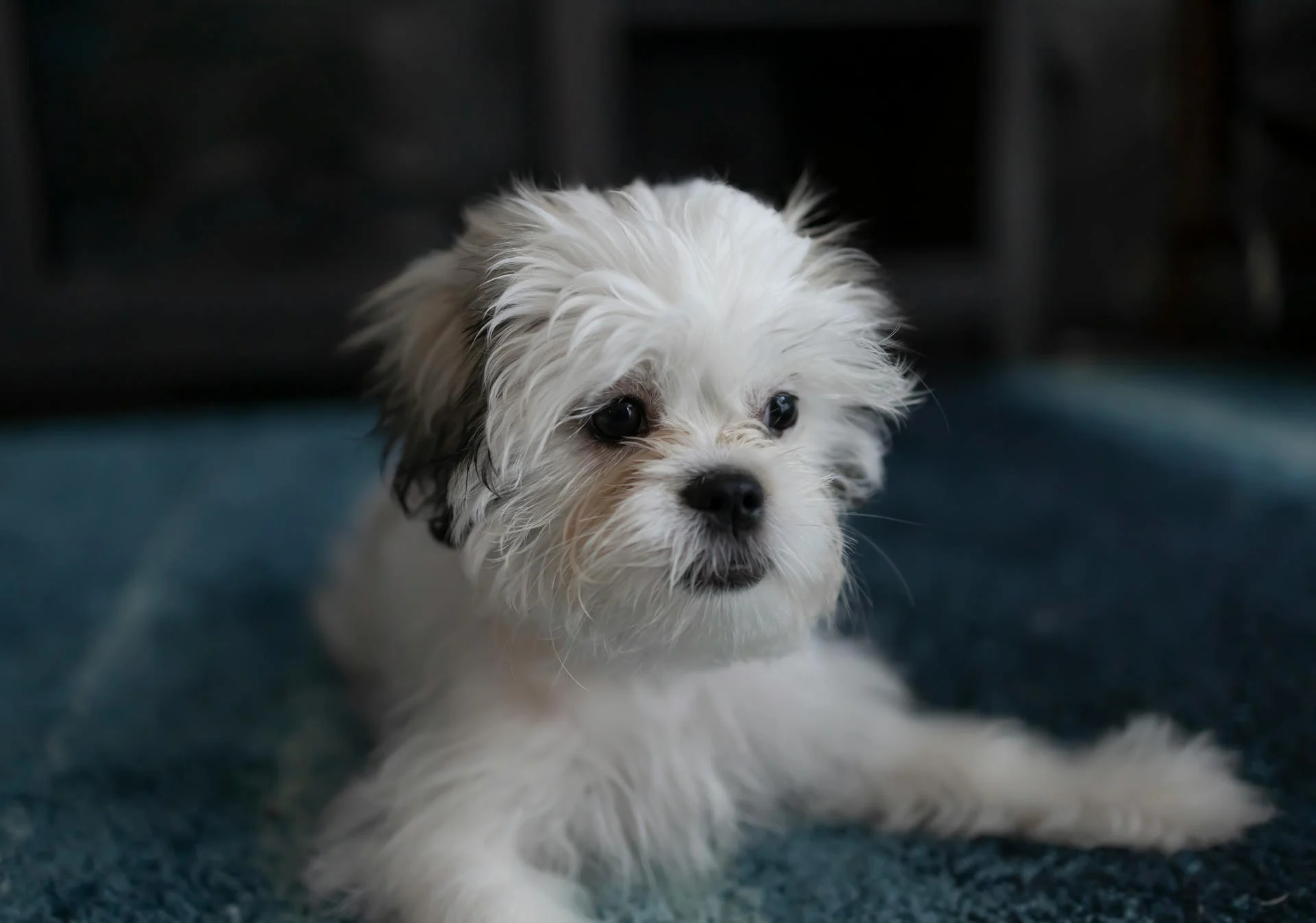
A cloudy eye in your dog can be a concerning symptom, but it's essential to know the possible causes and how to diagnose the issue. Corneal edema is a common condition in dogs, and it can be caused by various factors, including glaucoma, pigmentary keratitis, and dry eye.
Corneal edema can be diagnosed through a physical exam, Schirmer tear test, fluorescein stain, and tonometry. These tests help determine the underlying cause of the condition.
Some symptoms of corneal edema include redness, increased thick, ropey discharge from the eye, cloudy appearance of the eye, pain, excessive tearing, and eye enlargement. These symptoms can be caused by various conditions, including glaucoma, pigmentary keratitis, and dry eye.
Here are some possible causes of cloudy eyes in dogs:
- Glaucoma: a condition where the pressure inside the eye increases, resulting in damage to the structures in the eye.
- Pigmentary keratitis: a condition where chronic eye irritation and inflammation cause pigmentation on the cornea.
- Dry eye: a condition where the eyes don't produce enough tears, leading to eye discomfort and vision problems.
- Anterior uveitis: inflammation of the uvea, which can cause a cloudy appearance in the eye.
A veterinarian is the best person to diagnose the cause of your dog's cloudy eyes. They will perform a series of diagnostic tests, including a physical exam, Schirmer tear test, fluorescein stain, and tonometry, to determine the underlying cause of the condition.
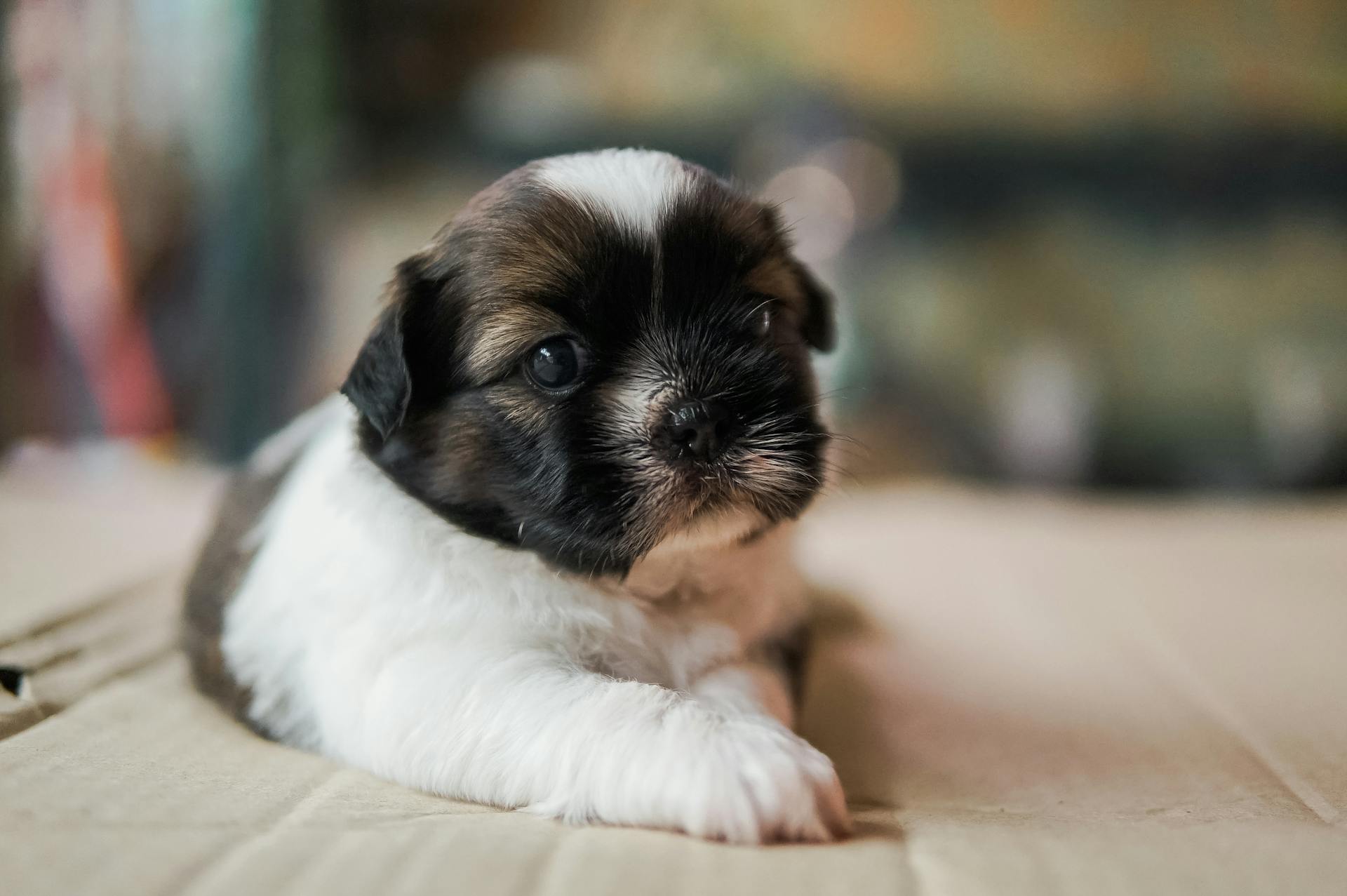
Symptoms of dry eye include cloudy eyes, inflammation of the eyelids, stringy, thick, yellow, or green eye discharge, eye redness, sensitivity to light, and painful eyes. If left untreated, dry eye can lead to permanent damage to the eyes, including blindness.
Here are some possible causes of dry eye:
- Genetic predisposition
- Immune system problems, such as allergies or autoimmune conditions
- Possible link to the hormonal condition diabetes mellitus
- Exposure to irritants, such as lawn chemicals or cleaners
Diagnosis of dry eye is based on medical history, clinical signs, and response to treatment. An examination by an ophthalmologist may be required for a definitive diagnosis. Some tests, including the Schirmer tear test, Rose Bengal staining, and Fluorescein dye, may be performed to measure the degree of damage to the surface of the eye.
Lenticular Sclerosis
Lenticular Sclerosis is a normal change that occurs in the lens of the eye as a dog ages. It's a natural part of the aging process.
The lens becomes thicker and more yellow, but this change doesn't affect a dog's vision. No treatment is necessary.
This condition can sometimes be confused with other eye problems, like cataracts. However, not all dogs with lenticular sclerosis will develop cataracts.
Here are the key differences between lenticular sclerosis and cataracts:
It's essential to have your veterinarian take a look at your dog's eyes to determine the cause of cloudy vision. They can help you understand what's going on and provide guidance on the best course of action.
Frequently Asked Questions
How to cure cloudy eyes in dogs?
Unfortunately, cloudy eyes in dogs are often irreversible, but treatment options like surgery for cataracts, medication for glaucoma, and observation for lenticular sclerosis may be necessary to manage symptoms and prevent further complications. Consult a veterinarian for a proper diagnosis and treatment plan.
How do you treat cataracts in Shih Tzus?
Surgery is the only treatment for cataracts in Shih Tzus, but your veterinarian will determine if it's a suitable option based on your dog's age and health status
Sources
- https://vetster.com/en/symptoms/dog/cloudy-eyes-corneal-edema-in-dogs
- https://www.akc.org/expert-advice/health/cloudy-eyes-in-dogs/
- https://www.dailypaws.com/dogs-puppies/health-care/dog-conditions/dog-eye-discharge
- https://www.allaboutvision.com/eye-care/pets-animals/pigmentary-keratitis-in-dogs/
- https://rockykanaka.com/cloudy-eyes-in-dogs/
Featured Images: pexels.com

